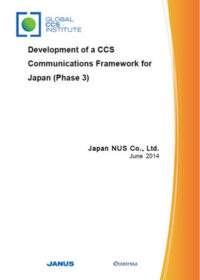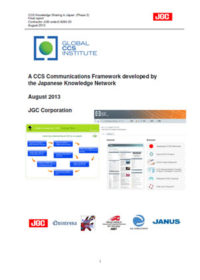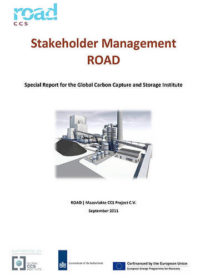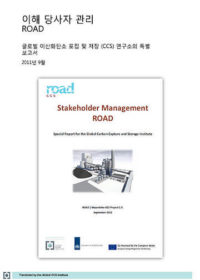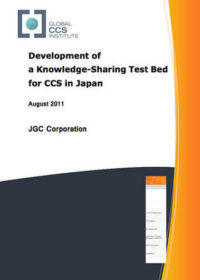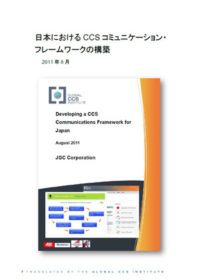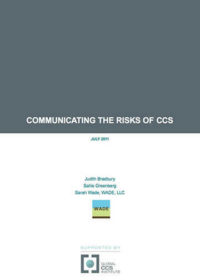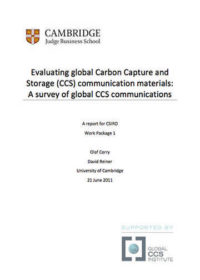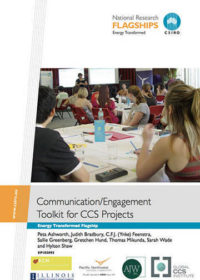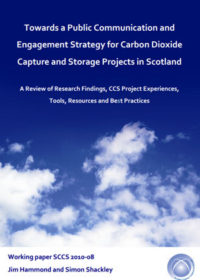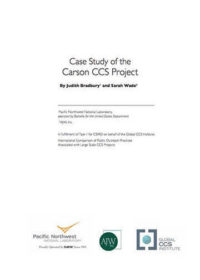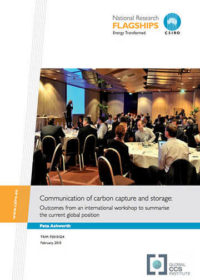Resources
Publications
Our publications, reports and research library hosts over 500 specialist reports and research papers on all topics associated with CCS.
View our Publication Library Disclaimer.
Filter by
Development of a CCS communications framework for Japan (phase 3)
1st June 2014
Topic(s): Capacity development, Carbon capture use and storage (CCUS), Communication, Public engagement
The Japanese Knowledge Network (JKN) is a group of over 20 organisations sharing knowledge on topics critical to accelerating carbon capture and storage (CCS) in Japan. A key task of the has been to create a framework for communicating CCS to the general public.
This report presents the findings of the third phase of the 'Development of a CCS Communications Framework for Japan’ project. It is a detailed analysis of the tools and methodologies developed by the network to communicate CCS in an accurate and accessible way. The framework was tested with a group of Japanese citizens who critiqued the information and its delivery for relevance and effectiveness.
This report is authored by Japan NUS Co. Ltd. (JANUS), partnered by Quintessa Japan, and supported by Global CCS Institute.
Other Phase Reports
- Developing a CCS communications framework for Japan - Phase 1, August 2011
- A CCS communications framework developed by the Japanese Knowledge Network – Phase 2, October 2013
Disclaimer
The content within the Global CCS Institute Publications, Reports and Research Library is provided for information purposes only. We make every effort and take reasonable care to keep the content of this section up-to-date and error-free. However, we make no claim as to its accuracy, currency or reliability.
Content and material featured within this section of our website includes reports and research published by third parties. The content and material may include opinions and recommendations of third parties that do not reflect those held by the Global CCS Institute.
A CCS communications framework developed by the Japanese Knowledge Network
8th October 2013
Topic(s): Carbon capture use and storage (CCUS), Communication, Public engagement
This report describes Phase 2 of a multi-phase project undertaken by the Japanese Knowledge Sharing Network, entitled “Development of a Knowledge Sharing Test Bed for CCS in Japan”. The focus of the network has been to:
1) Develop and test a public outreach program for carbon capture and storage (CCS), based on expert arguments developed in Phase 1 of the project on how to explain the case for CCS through a communications framework.
2) Address knowledge gaps identified on the topic of CO2 storage, in particular seismicity induced by injection of CO2, and the impact of seismicity on any part of the CCS process.
Other Phase Reports
- Developing a CCS communications framework for Japan - Phase 1, August 2011
- Development of a CCS communications framework for Japan - Phase 3, June 2014
Disclaimer
The content within the Global CCS Institute Publications, Reports and Research Library is provided for information purposes only. We make every effort and take reasonable care to keep the content of this section up-to-date and error-free. However, we make no claim as to its accuracy, currency or reliability.
Content and material featured within this section of our website includes reports and research published by third parties. The content and material may include opinions and recommendations of third parties that do not reflect those held by the Global CCS Institute.
Stakeholder management: ROAD. Special report to the Global Carbon Capture and Storage Institute
13th September 2011
Topic(s): Carbon capture use and storage (CCUS), Communication, Public engagement
ROAD stands for ‘Rotterdam Opslag en Afvang Demonstratieproject’ (Rotterdam Capture and Storage Demonstration Project) and is one of the largest integrated demonstration projects in the world for the capture and storage of CO2, based on a new coal-fired power station located outside of Rotterdam, the Netherlands.
The ROAD project has received support from the Institute to contribute to the international development of knowledge, experience and information on CCS. Ultimately, the development of hands-on CCS knowledge and expertise should accelerate the commercial deployment of CCS projects worldwide.
In this report, the Stakeholder Management function of the ROAD Project is described. Stakeholder Management within ROAD comprises permitting, regulatory affairs, and communications and public engagement. This report aims to help other CCS projects with developing an integrated Stakeholder Management approach.
Disclaimer
The content within the Global CCS Institute Publications, Reports and Research Library is provided for information purposes only. We make every effort and take reasonable care to keep the content of this section up-to-date and error-free. However, we make no claim as to its accuracy, currency or reliability.
Content and material featured within this section of our website includes reports and research published by third parties. The content and material may include opinions and recommendations of third parties that do not reflect those held by the Global CCS Institute.
이해 당사자 관리 ROAD
1st September 2011
Topic(s): Carbon capture use and storage (CCUS), Communication, Public engagement
Disclaimer
The content within the Global CCS Institute Publications, Reports and Research Library is provided for information purposes only. We make every effort and take reasonable care to keep the content of this section up-to-date and error-free. However, we make no claim as to its accuracy, currency or reliability.
Content and material featured within this section of our website includes reports and research published by third parties. The content and material may include opinions and recommendations of third parties that do not reflect those held by the Global CCS Institute.
Developing a CCS communications framework for Japan
1st August 2011
Topic(s): Carbon capture use and storage (CCUS), Communication, Public engagement
In partnership with the Global CCS Institute, JGC Corporation, Quintessa, National Institute of Advanced Industrial Science and Technology (AIST) and McKinley Consulting established and have been running a knowledge sharing network amongst several of the Institute’s Japanese Members since December 2010.
As a part of the network’s initial project, Developing a CCS Communications Framework for Japan, several major Japanese organisations involved with CCS have collaborated to explore:
- how the Institute and its Members can collaborate to synthesise expert knowledge relating to issues identified, which is distributed over a wide variety of disciplines/research areas, into a coherent body of knowledge; and
- how the Institute can distill detailed expert knowledge and present it in a simpler form that can be understood by stakeholders with different levels of scientific/technical literacy.
This report sets out the main outputs of the Network's pilot phase, including:
- establishment of a community of key staff from interested organisations, procedures for facilitating knowledge sharing and required communication tools, i.e., the Institute’s digital platform;
- specification of (possibly Japan-specific) requirements for promotion of CCS understanding;
- compilation of a knowledge base of past communication efforts and an assessment of their effectiveness;
- development of an action plan for improving CCS understanding and stakeholder participation in national dialogue; and
- development of an ‘Argumentation model’ supporting CCS in Japan.
Other Phase Reports
- CCS communications framework developed by the Japanese Knowledge Network - Phase 2, October 2013
- Development of a CCS communications framework for Japan (phase 3) - Phase 3, June 2014
Disclaimer
The content within the Global CCS Institute Publications, Reports and Research Library is provided for information purposes only. We make every effort and take reasonable care to keep the content of this section up-to-date and error-free. However, we make no claim as to its accuracy, currency or reliability.
Content and material featured within this section of our website includes reports and research published by third parties. The content and material may include opinions and recommendations of third parties that do not reflect those held by the Global CCS Institute.
日本におけるCCSコミュニケーション・フレームワークの構築
1st August 2011
Topic(s): Carbon capture use and storage (CCUS), Communication, Public engagement
知識の共有は、CCSコミュニティにとって必要不可欠であり、グローバルCCSインスティテュートが中心的役割を演じている分野である。「日本におけるCCSコミュニケーション・フレームワークの構築」というこのプロジェクトは、国際的な環境でより幅広くこの手法を利用する事を前提に、パイロット規模で知識管理システム(KMS)のプロトタイプを検証すること目標としており、主なテーマは以下のとおりである。
- 特定された問題に関して、様々な学問領域/研究分野に分布している専門知識を、インスティテュートおよびそのメンバーが協力して、どのように有機的な知識体系に統合するか
- グローバルCCSインスティテュートがどのように詳細な専門知識の本質を洗い出し、それを様々なレベルの科学・技術水準を有する利害関係者が理解できる簡潔な形で示すか
コミュニティーメンバーとの共同作業から得られた主なアウトプットは以下のとおりである
- 利害関係団体の重要な人員から成るコミュニティ、知識の共有を促進する手順、および必要なコミュニケーションツール、すなわちインスティテュートのデジタルプラットフォームを確立すること
- CCSの理解を促進するための(おそらく日本固有の)要件の特定
- 過去のコミュニケーションの努力と、その有効性の評価に関する知識ベースをまとめる
- CCSへの理解を向上させ、国内での対話への利害関係者の参加を促すためのアクションプランの作成
- 日本においてCCSをサポートする「アーギュメンテーション(討論)モデル」の開発
Disclaimer
The content within the Global CCS Institute Publications, Reports and Research Library is provided for information purposes only. We make every effort and take reasonable care to keep the content of this section up-to-date and error-free. However, we make no claim as to its accuracy, currency or reliability.
Content and material featured within this section of our website includes reports and research published by third parties. The content and material may include opinions and recommendations of third parties that do not reflect those held by the Global CCS Institute.
Communicating the risks of CCS
1st July 2011
Topic(s): Carbon capture use and storage (CCUS), Communication, Public engagement
Developing an understanding of how people view CCS technology can, in turn, help in developing effective programs for risk communication. This is important because it can form the basis for working with the public to develop projects.
Understanding the way in which people evaluate project risks is a topic that has been studied extensively in the social science literature, and we are now gaining direct experience from early CCS projects.
This report aims to provide a better understanding of what we have learnt about the ways in which people view risk more expansively than just a technical and scientific assessment would indicate and the importance of addressing this view. The report builds on previous work including a communications / engagement toolkit for CCS projects and a social site characterisation toolkit. It is intended to assist those involved in the planning and implementation of CCS projects to develop more effective and productive stakeholder engagement programs.
The report is broken down into the different sections – covering various aspects of risk and communications: following the introduction, Part 2 of the report reviews the theoretical underpinnings for an approach to risk communication. For Part 3, the authors interviewed representatives from five North American CCS projects to review project experience in risk communication and summarise lessons learnt from those experiences. Based on these lessons, the authors suggest, in Part 4, an iterative five-step strategy for learning how the community views the project and for developing effective risk communication programs. This final part also provides the reader with a series of pointers and resources for use in developing risk communication programs.
Disclaimer
The content within the Global CCS Institute Publications, Reports and Research Library is provided for information purposes only. We make every effort and take reasonable care to keep the content of this section up-to-date and error-free. However, we make no claim as to its accuracy, currency or reliability.
Content and material featured within this section of our website includes reports and research published by third parties. The content and material may include opinions and recommendations of third parties that do not reflect those held by the Global CCS Institute.
Evaluating global carbon capture and storage (CCS) communication materials: a survey of global CCS communications
21st June 2011
Topic(s): Carbon capture use and storage (CCUS), Communication, Public engagement
CCS communications are likely to play a crucial part in determining what kind of role CCS eventually ends up playing in the energy and climate infrastructures currently being planned and built around the world. With CCS not yet operating on a commercial scale, CCS communications via media coverage, visits to science museums, and especially websites, make up a significant part of the ‘CCS’ that most people will experience. As Hammond and Shackley (2010) point out, the images and presentation of CCS, more than actual CCS infrastructure or experiences with CCS, make up what CCS means to most people at the present time. The importance therefore of questions about how CCS is being communicated becomes imperative, specifically, how such communication is, and may be, developing and where it might be enhanced and improved in the future.
This report reviews the scope and key characteristics of carbon dioxide capture and storage (CCS) communications and primarily builds upon a comprehensive Global CCS Communications Database that was compiled for this project. The report also draws upon investigations of non-web sources, including books, articles, media reporting of CCS, educational materials and museum exhibits, to provide as varied and comprehensive an overview as possible of CCS communication practices to date.
The headline findings are:
- Overall, progress is slow and sporadic but gradually building in scale and scope.
- The focus is still on how CCS works, rather than how it might be made to work and the overall benefits.
- Transport is the ‘invisible’ technology.
- There is a heavy reliance on climate change as the sole rationale justifying CCS.
- A large majority of CCS communications material is overtly positive.
- Communications by research institutions are usually narrowly technical, but more critical sources tend to focus on a wider set of issues, especially social concerns.
- The Internet remains the focus for CCS communication.
- English remains the primary language of CCS communication.
- The ‘one-size-fits-all’ approach limits potential usefulness to many groups.
- Educational materials are being developed but only slowly.
Disclaimer
The content within the Global CCS Institute Publications, Reports and Research Library is provided for information purposes only. We make every effort and take reasonable care to keep the content of this section up-to-date and error-free. However, we make no claim as to its accuracy, currency or reliability.
Content and material featured within this section of our website includes reports and research published by third parties. The content and material may include opinions and recommendations of third parties that do not reflect those held by the Global CCS Institute.
Communication/engagement toolkit for CCS projects
24th March 2011
Topic(s): Carbon capture use and storage (CCUS), Communication, Public engagement
Global research highlights that public engagement risks for CCS projects constitute one of the many non-technical aspects of the overall project risk profile. As an industry, CCS has seen some poor outcomes in this area, with a number of projects delayed or stopped because of public concerns. The Communications/Engagement Toolkit for CCS Projects was identified in collaboration with the Australian Commonwealth Scientific and Industrial Research Organisation (CSIRO) as a way to help project proponents plan their engagement activities and benefit from the experience of others.
The toolkit has been designed as a practical guide for CCS project developers. It is intended to assist in the design and management of communication and engagement activities for individual CCS projects. It provides a range of methods and activities for addressing the important social considerations for successful CCS project deployment. This social data and analysis represents the earliest stage of the stakeholder engagement continuum and it has the potential to help proponents to establish positive working relationships with local communities for the life of the project.
The toolkit provides project proponents with a set of activities and work sheets within the following areas: gathering social data, undertaking a SWOT analysis, preparing a stakeholder analysis and developing a high level public engagement plan.
The Institute commissioned the toolkit with the CSIRO, in association with the global social research network, and it forms part of a broader project entitled 'An International Comparison of CCS Communication activities'. The project is a long-term initiative to:
- understand the effectiveness of public engagement approaches globally; and
- provide tools to better inform the early stages of outreach strategy development.
The process included key global research institutions undertaking interviews with CCS project stakeholders, desk-top research, and focus groups to develop five key case studies on the following projects:
- Barendrecht;
- FutureGen;
- Carson;
- Otways; and
- ZeroGen.
An overview report which synthesises the key findings from the case studies includes a set of evaluation factors which can also be helpful for project developers to assist in evaluating the components that are required for effective project deployment. Download this overview report.
The toolkit builds on the findings from the case studies and underwent a series of global workshops and peer reviews to help shape the current content. It has the potential of being applied to other energy technologies such as geothermal, wind, and other sources. It is intended to be an organic document, which is built upon and developed as more CCS projects (or alternate energy projects) undertake public engagement activities and contribute learnings.
The Institute encourages comments and feedback on the toolkit to help optimise its content, and provide additional case studies from road-testing it. These comments can be shared below when logged in.
Disclaimer
The content within the Global CCS Institute Publications, Reports and Research Library is provided for information purposes only. We make every effort and take reasonable care to keep the content of this section up-to-date and error-free. However, we make no claim as to its accuracy, currency or reliability.
Content and material featured within this section of our website includes reports and research published by third parties. The content and material may include opinions and recommendations of third parties that do not reflect those held by the Global CCS Institute.
Towards a public communication and engagement strategy for carbon dioxide capture and storage projects in Scotland: a review of research findings, CCS project experiences, tools, resources and best practices
6th December 2010
Topic(s): Carbon capture use and storage (CCUS), Communication, Public engagement
The purpose of this Scottish Carbon Capture & Storage report is to stimulate the design of effective engagement strategies between the public and proponents of CCS projects in Scotland. Engagement is the process of having an informed, two-way discussion as to whether a CCS project is appropriate in a particular locality and context. Successful engagement is not a guarantee that every project will go ahead. Projects may be rejected by publics even if they are technically viable, and establishing if this is the case early on would greatly speed the search for a suitable site. However if the reasons for a CCS project are sound, the plans carefully laid, and social conditions favourable, a good engagement strategy should greatly increase the chances of acceptance.
This report was authored by Jim Hammond and Simon Shackley. The work was funded under the Scottish Carbon Capture, Transport and Storage Development Study
Disclaimer
The content within the Global CCS Institute Publications, Reports and Research Library is provided for information purposes only. We make every effort and take reasonable care to keep the content of this section up-to-date and error-free. However, we make no claim as to its accuracy, currency or reliability.
Content and material featured within this section of our website includes reports and research published by third parties. The content and material may include opinions and recommendations of third parties that do not reflect those held by the Global CCS Institute.
Case study of the Carson CCS Project
12th October 2010
Topic(s): Carbon capture use and storage (CCUS), Communication, Public engagement
This report is one of a series of case study reports undertaken by CSIRO as part of an international comparison of communication and engagement practices surrounding carbon dioxide capture and storage (CCS) projects funded by the Global CCS Institute.
This case study examines the plan by BP to construct and operate a commercial hydrogen power plant with carbon capture and storage (CCS), in Carson, California. Carbon dioxide would be captured at the plant and piped to a location in nearby oilfields for enhanced oil recovery (EOR) that would result in carbon dioxide storage. The purpose of the study is to identify key lessons learned in communicating about future sequestration projects.
Disclaimer
The content within the Global CCS Institute Publications, Reports and Research Library is provided for information purposes only. We make every effort and take reasonable care to keep the content of this section up-to-date and error-free. However, we make no claim as to its accuracy, currency or reliability.
Content and material featured within this section of our website includes reports and research published by third parties. The content and material may include opinions and recommendations of third parties that do not reflect those held by the Global CCS Institute.
Communication of carbon capture and storage: outcomes from an international workshop to summarise the current global position
1st February 2010
Topic(s): Carbon capture use and storage (CCUS), Communication, Public engagement
The inaugural conference was hosted by the Commonwealth Scientific and Industrial Research Organisation (CSIRO). In total, ninety-eight international representatives from industry, government, non-government organisations, researchers, and communication practitioners came together to participate in an interactive day specifically tailored to summarise the current global position on communicating for CCS deployment. The reports details the presentations made and makes some conclusions about future activities required.
The challenge of understanding public perceptions of CCS and how to communicate the risks and benefits of the technology is something that social researchers from leading international research institutions have been grappling with for some years. Up till now, the opportunity to share their findings with interested industry partners has been somewhat ad hoc as more technical issues have always taken priority. However, as the urgency to deploy CCS has risen across the world, and evidence of failed attempts to achieve local community support for projects comes to hand, it is apparent that this issuecould become a commercial show stopper for CCS. Therefore this opportunity to share findings from the research was well received from the range of stakeholders involved in CCS deployment.
Disclaimer
The content within the Global CCS Institute Publications, Reports and Research Library is provided for information purposes only. We make every effort and take reasonable care to keep the content of this section up-to-date and error-free. However, we make no claim as to its accuracy, currency or reliability.
Content and material featured within this section of our website includes reports and research published by third parties. The content and material may include opinions and recommendations of third parties that do not reflect those held by the Global CCS Institute.
